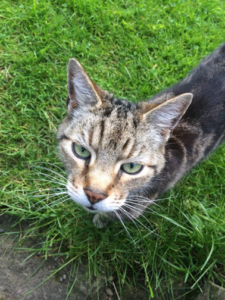Lizzie Ette. Lecturer in Nursing, The University of Hull

This week’s EBN Twitter Chat is on Wednesday 1st February between 8-9 pm (UK time).
The chat will be led by Lizzie Ette (j.ette@hull.ac.uk ), Lecturer in Pre-registration Nursing, The University of Hull.
Participating in the Twitter chat requires a Twitter account; if you do not have one you can create an account at www.twitter.com. Once you have an account, contributing is straightforward. You can follow the discussion by searching links to #ebnjc, or contribute by creating and sending a tweet (tweets are text messages limited to 140 characters) to @EBNursingBMJ adding #ebnjc (the EBN Twitter chat hash tag) to your tweet, this allows everyone taking part to view your tweets
The power of reflection in nursing
As is so often the case, professional and personal lives are intricately related, and the recent experience of losing our family cat Reggie, following a road traffic accident at Christmas, really got me to reconsider the power of reflection on a personal level, and this got me thinking deeply about how important reflection is in my professional capacity, as a nurse.
 Reggie: 2000-2017
Reggie: 2000-2017
Caring for Reg as I did in his last days of life was a positive experience and looking back I feel confident that I did a good job in caring for our lovely old cat. Unfortunately, my experience of supporting three young children through the demise of their much loved pet was not quite so successful. I had no experience to draw on here and found myself feeling pretty self –critical of my actions. However, having now spent some time reflecting and reading related material online, I realised how much it taught me about how different my children’s needs are from my own, and from one another’s. I can acknowledge how I would now do things differently. Sadly, only when we have another bereavement of some sort can I get to test out my new learning, that all-important step of doing things better next time.
Boud et al. (1985, p.19) offer a simple definition of reflection,
‘Reflection is an important human activity in which people recapture their experience, think about it, mull over & evaluate it. It is this working with experience that is important in learning’.

The importance of reflection in nursing cannot be understated. It can be used on many levels; to reflect on a specific incident, a moment in time even, and the actions, thoughts and feelings associated with that moment, or can be used to help create an understanding of a more general time period, by breaking down, considering, analysing and critiquing the who, what, why, when and how of the events of that time ( Gibbs (1988),; Johns (1995) ; Driscoll (2007) ). It can be used to reflect on situations as they occur – reflection in action – and on events from the past – reflection on action (Schön, 1983). Additionally, it can be used to recognise new skills and articulate planned new approaches. All of these mechanisms are thought to improve a nurse’s practice.
However, some are critical of reflective practice in its current form. Rolfe (2014), for example, argues that reflective practice has had a disappointing impact upon nurse education and practice, suggesting that it is the poor interpretation and implementation of reflective practice that has resulted in this lack of progress. Likewise, Nelson (2012) suggests that the present wide acceptance of ‘institutionally governed’ reflection is ironic given Schön and other’s original intentions for the use of reflection.
Despite this, reflection does indeed form a major element of nurses’ ability to renew their professional registration (revalidation). The NMC states that for successful revalidation…
“You must have prepared five written reflective accounts in the three year period since your registration was last renewed or you joined the register. Each reflective account must be recorded on the approved form and must refer to:
- an instance of your CPD, and/or
- a piece of practice-related feedback you have received, and/or
- an event or experience in your own professional practice and how they relate to the Code.”
Taken from the NMC (2017), the above demonstrates a key driver for understanding the importance of reflection in nursing: the need for nurses to engage in reflection in order to secure ongoing professional registration.
If nurses are obliged to undertake this activity, the evidence suggests that it is highly beneficial for them to commit to doing it wholeheartedly, and to the best of their ability, in order to maximise the genuine learning that can be gained from doing so.
Some simple guides to reflection and reflective writing skills can be found here and here and you can complete a free online module in order to develop your skills of reflection here
The questions I will be posing via the Twitter chat are as follows:
- How important do you think reflection is in nursing?
- How have you benefitted professionally from undertaking reflective practice?
- How useful has reflection been for the purposes of revalidation, for you/others?
- What needs to be done to improve reflective practices, if anything?
References
Boud, D., Keogh, R. & Walker, D. (1985) Reflection: Turning Experience into Learning. London: Kogan Page.
Driscoll, J. (2007) Practicing Clinical Supervision: A Reflective Approach for Healthcare Professionals. 2nd ed. Edinburgh: Balliere Tindall Elsevier.
Gibbs, G. (1988) Learning by Doing: A guide to teaching and learning methods. Further Education Unit. Oxford: Oxford Polytechnic.
Johns, C. (1995) Framing learning through reflection within Carper’s fundamental ways of knowing in nursing. Journal of Advanced Nursing. 22: 226-34
Nelson, S. (2012) The lost path to emancipatory practice: towards a history of reflective practice in nursing. Nursing Philosophy. 13(3) 202-213
Rolfe, G. (2014) Rethinking reflective education: What would Dewey have done? Nurse Education Today. 34 (8) 1179 – 1183
Schön, D. (1983) The Reflective Practitioner: How professionals think in action. London: Temple Smith